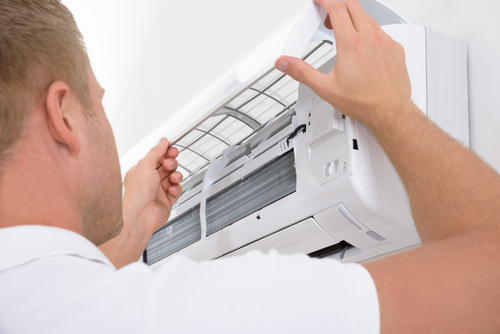Your air conditioner can be a life saver, but it also has the potential to be an irritating and inefficient complete waste of power. The difference between these states, however, is quite a bit smaller than you might imagine, and it comes down to an incredibly simple concept: preventative maintenance. It’s simple when you think about it, really—take care of your air conditioner, and it will function optimally. You end up cooler while spending less money. Still, you’d be surprised by how many people neglect their air conditioners, then wonder why their utility bills are climbing while they remain hot and sweaty in their homes.
If you have an HVAC system, you need to know a couple of things about maintenance to keep it running smoothly—even if it’s just when to call in a professional for help. Here are a few air conditioning preventative maintenance things you can learn to do quickly to keep your HVAC in good shape.
 Monthly tasks: quick, easy and painless
Monthly tasks: quick, easy and painless
Not all HVAC maintenance requires a detailed understanding of how your unit works. A lot of it is pretty basic. Just walking past your outdoor unit on a regular basis to clear a two-foot area around it is an excellent way to make sure twigs, grass, and other debris doesn’t make its way into the system. Many HVAC complications are caused by clogging from the outside, so simple tasks like this will prevent many problems before they cause havoc. Another easy task is changing your filters. Filters increase the quality of the air circulating in your machine, preventing microbes and other bacteria from building up and obstructing airflow or damaging sensitive components. Using a high-efficiency filter and changing it each month is an extraordinarily effective way to prevent this from happening. With plenty of exciting filter options on the market these days, this is a convenient and sustainable way to keep your HVAC healthy.
Long term: tougher but no less important
Taking care of little tasks like filter maintenance and grounds keeping once a month will solve a lot of problems, but it’s not all you need to do for your HVAC. You’ll also want to undertake a few more major projects that can have a significant impact on your unit. For the following, you’ll want to seek the help of an HVAC professional to:,
- make sure all moving parts in your AC are lubricated a couple of times each year to decrease the amount of friction in the motors and prevent your machine from working too hard.
- Inspect your condensation drainto avoid blockages. A blocked drain leads to rising humidity levels and potential water damage in your building.
- Go over your system controls and thermostat settings just to make sure your electrical connections are sound. If they aren’t, your HVAC professional is equipped to correct the situation.
What to expect from HVAC maintenance pros
Hiring a contractor to perform maintenance on your HVAC is seen by some as a last resort, but it shouldn’t be. HVAC maintenance is a difficult task requiring a unique set of skills, which means that using a service is often the best way to get your unit in shape quickly and reliably again. A quality service technician can take care of all the tasks listed above, as well as some specific duties related to your heating and cooling functions.
Heating and cooling issues
If there are any problems with leaking refrigerant or faulty gas connections, a seasoned technician will be able to spot them and correct them safely. Leaking coolant is one of the most common cooling issues, but some HVAC owners don’t understand how much of a problem it can be in the long run. Refrigerant leaks pose obvious threats to the environment, but they can also cause lasting damage to the condenser in your unit, which means that the sooner you have them taken care of the less elaborate of a fix you’ll need. A bad gas connection, on the other hand, can be a significant fire hazard and should be handled as quickly as possible by someone with the appropriate training.
Parting thoughts
Keep the above in mind, and you’ll have a much better idea of when to service your HVAC, as well as what you can expect to accomplish on your own. No matter how you choose to approach AC maintenance, remember—it’s a necessary part of keeping your system functional and your building safe.
